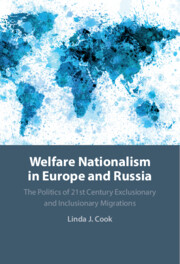 Welfare Nationalism in Europe and Russia
Welfare Nationalism in Europe and Russia Book contents
- Welfare Nationalism in Europe and Russia
- Reviews
- Welfare Nationalism in Europe and Russia
- Copyright page
- Dedication
- Contents
- Figures
- Tables
- Preface
- Acknowledgments
- Note on Terminology
- Abbreviations
- Part I Introduction
- 1 Exclusionary and Inclusionary Migrations
- Part II Economic Drivers and Political Mobilizers of Welfare Nationalism and Exclusion in Russia and Europe
- Part III Exclusionary Migrations
- Part IV Inclusionary Migrations
- References
- Index
1 - Exclusionary and Inclusionary Migrations
Concepts, Cases, and Overview of the Book’s Argument
from Part I - Introduction
Published online by Cambridge University Press: 14 November 2024
- Welfare Nationalism in Europe and Russia
- Reviews
- Welfare Nationalism in Europe and Russia
- Copyright page
- Dedication
- Contents
- Figures
- Tables
- Preface
- Acknowledgments
- Note on Terminology
- Abbreviations
- Part I Introduction
- 1 Exclusionary and Inclusionary Migrations
- Part II Economic Drivers and Political Mobilizers of Welfare Nationalism and Exclusion in Russia and Europe
- Part III Exclusionary Migrations
- Part IV Inclusionary Migrations
- References
- Index
Summary
Chapter 1 lays out the book’s argument about the rise and sources of welfare nationalism. It explains the significance of the study in focusing on migration issues that are major sources of contemporary political and humanitarian crises and shows ‘how we got here’ – how these crises have built since the 1990s in Europe and Russia. The chapter explains the book’s key concepts: welfare nationalism, exclusion and inclusion, and populism, and sets the study within the literature on international migration and welfare. It focuses on the key role of ethnicity and the importance of political elites and mass media in influencing responses to migration and identifies contrasting cycles: Exclusionary migrations involve a “vicious cycle” of hostile public opinion toward more-or-less ethnically distant migrants that is reinforced and exploited by politicians for enhanced influence, amplified by mass media, and produces policies of exclusion. By contrast, inclusionary migrations involve a “virtuous cycle” of relatively receptive public opinion toward ethnically close migrants, high-level political support, elites’ management of nationals’ grievances, and positive treatment in mass media, producing policies of inclusion. The conclusion provides an overview of the book’s structure and a summary of each chapter.
Keywords
- Type
- Chapter
- Information
- Welfare Nationalism in Europe and RussiaThe Politics of 21st Century Exclusionary and Inclusionary Migrations, pp. 3 - 30Publisher: Cambridge University PressPrint publication year: 2024
